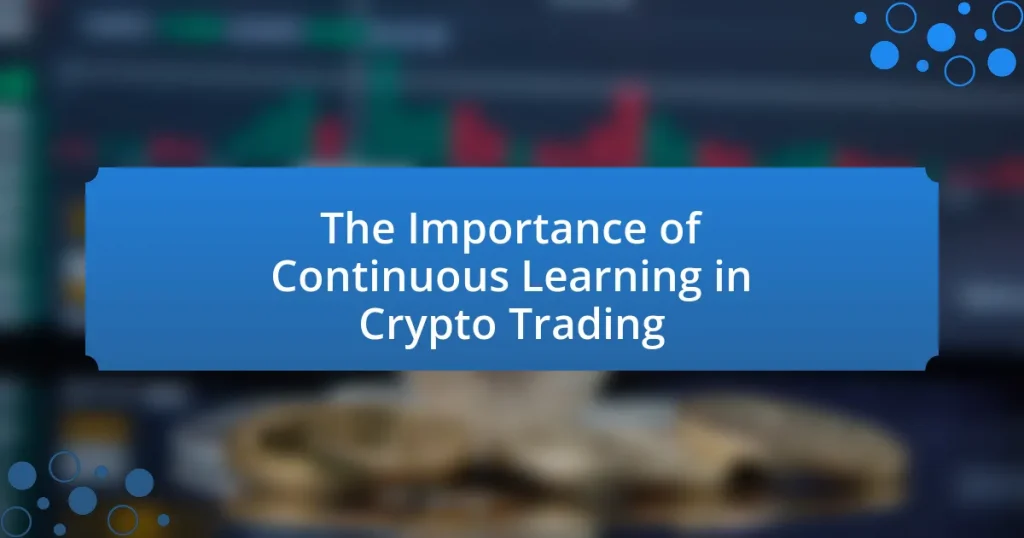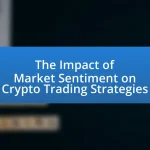The article emphasizes the critical role of continuous learning in crypto trading, highlighting the necessity for traders to adapt to the market’s volatility and evolving technologies. It outlines the key challenges faced by traders, including market unpredictability, regulatory changes, and security risks, and discusses how ongoing education enhances trading performance and risk management. The article also explores various methods for continuous learning, such as online courses, webinars, and community engagement, while detailing the long-term benefits of knowledge acquisition on decision-making and emotional discipline in trading. Additionally, it provides practical tips for creating personalized learning plans and measuring progress in trading education.
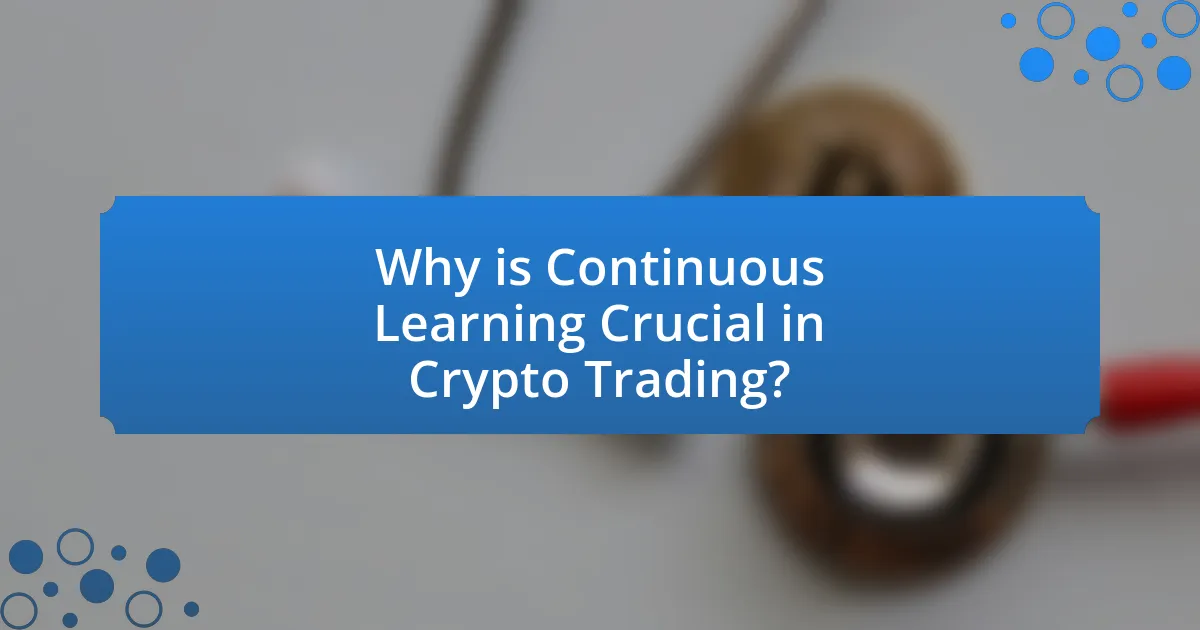
Why is Continuous Learning Crucial in Crypto Trading?
Continuous learning is crucial in crypto trading because the market is highly volatile and constantly evolving. This dynamic environment requires traders to stay updated on new technologies, regulatory changes, and market trends to make informed decisions. For instance, the introduction of decentralized finance (DeFi) and non-fungible tokens (NFTs) has significantly altered trading strategies and opportunities. Research indicates that traders who engage in continuous education are more likely to adapt successfully to market fluctuations, as they can leverage new information and tools effectively. Therefore, ongoing learning directly correlates with improved trading performance and risk management in the crypto space.
What are the key challenges faced by crypto traders?
Crypto traders face several key challenges, including market volatility, regulatory uncertainty, and security risks. Market volatility is significant, with cryptocurrencies often experiencing price swings of over 10% within a single day, making it difficult for traders to predict price movements accurately. Regulatory uncertainty arises from varying laws across jurisdictions, which can impact trading strategies and compliance requirements. Security risks are prevalent, as exchanges and wallets can be vulnerable to hacks, leading to potential loss of funds. According to a report by Chainalysis, over $3.2 billion was stolen from cryptocurrency exchanges in 2020 alone, highlighting the importance of security measures for traders.
How do market volatility and unpredictability impact trading strategies?
Market volatility and unpredictability significantly influence trading strategies by necessitating adaptive approaches to risk management and decision-making. Traders often adjust their strategies to account for rapid price fluctuations, employing techniques such as stop-loss orders and diversification to mitigate potential losses. For instance, during periods of high volatility, historical data shows that traders may increase their use of technical analysis to identify short-term trading opportunities, as evidenced by a 2020 study from the Journal of Financial Markets, which found that traders who adapted their strategies to volatility were more successful in capturing gains. Thus, understanding and responding to market volatility is crucial for effective trading in unpredictable environments.
What role does technological advancement play in trading practices?
Technological advancement significantly enhances trading practices by increasing efficiency, accuracy, and accessibility. Innovations such as algorithmic trading, high-frequency trading, and blockchain technology enable traders to execute transactions at unprecedented speeds and with reduced human error. For instance, algorithmic trading accounts for over 60% of all U.S. equity trading, demonstrating its impact on market dynamics. Additionally, advancements in data analytics and machine learning allow traders to analyze vast amounts of market data in real-time, leading to more informed decision-making. These technologies not only streamline operations but also democratize access to trading platforms, allowing a broader range of participants to engage in the market.
How does continuous learning enhance trading performance?
Continuous learning enhances trading performance by equipping traders with updated knowledge and skills necessary to adapt to market changes. As financial markets are dynamic, traders who engage in continuous learning can better understand emerging trends, new technologies, and evolving strategies. Research indicates that traders who regularly update their skills and knowledge can improve their decision-making processes, leading to more informed and profitable trades. For instance, a study by the CFA Institute found that continuous education significantly correlates with better investment performance, highlighting the importance of staying informed in a rapidly changing environment.
What skills can traders develop through ongoing education?
Traders can develop analytical skills, risk management abilities, and emotional discipline through ongoing education. Analytical skills enable traders to interpret market data and trends effectively, enhancing their decision-making processes. Risk management abilities help traders assess potential losses and implement strategies to mitigate them, which is crucial in the volatile crypto market. Emotional discipline allows traders to maintain composure during market fluctuations, reducing impulsive decisions that can lead to significant losses. Continuous education, such as attending workshops or online courses, reinforces these skills, ensuring traders remain competitive and informed in an ever-evolving landscape.
How does knowledge of market trends influence decision-making?
Knowledge of market trends significantly influences decision-making by enabling traders to anticipate price movements and adjust their strategies accordingly. Understanding trends allows traders to identify potential entry and exit points, manage risks effectively, and capitalize on emerging opportunities. For instance, a study by the CFA Institute found that 70% of successful traders attribute their performance to their ability to analyze market trends and adapt their strategies in real-time. This data underscores the critical role that trend analysis plays in informed decision-making within the dynamic environment of crypto trading.
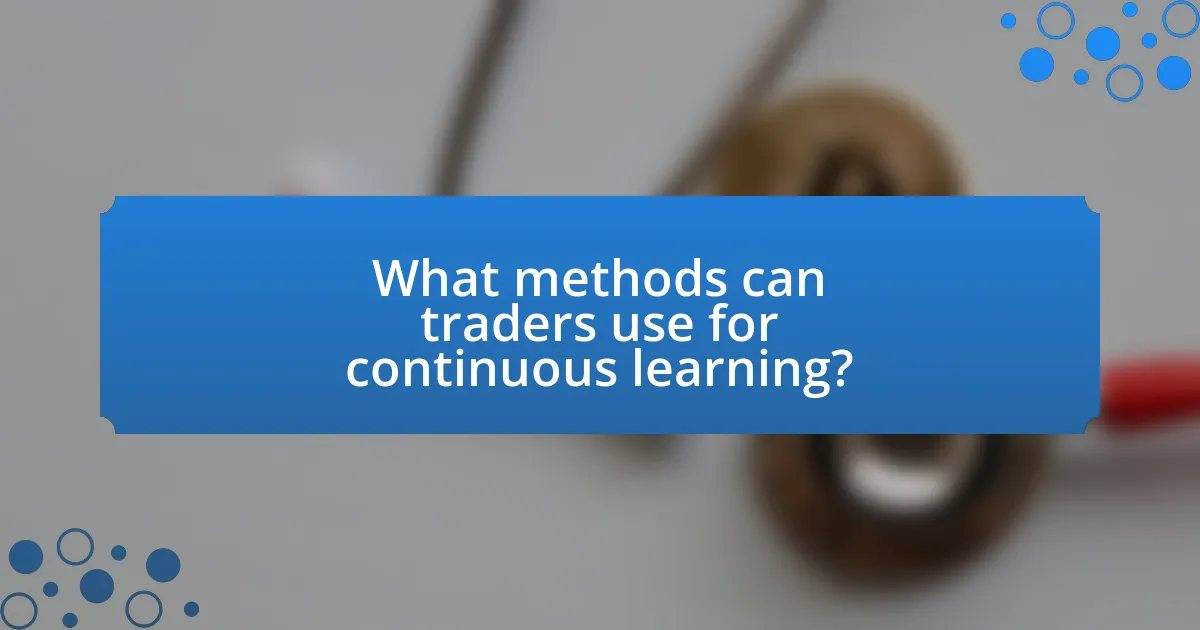
What methods can traders use for continuous learning?
Traders can use various methods for continuous learning, including online courses, webinars, trading simulations, and reading industry-related books and articles. Online courses provide structured learning on trading strategies and market analysis, while webinars offer real-time insights from experienced traders. Trading simulations allow traders to practice strategies without financial risk, enhancing their decision-making skills. Additionally, reading books and articles keeps traders updated on market trends and new techniques. Research indicates that continuous education significantly improves trading performance, as traders who engage in ongoing learning are better equipped to adapt to market changes.
What resources are available for crypto trading education?
Various resources are available for crypto trading education, including online courses, webinars, books, and forums. Online platforms like Coursera and Udemy offer structured courses on cryptocurrency trading, often created by industry experts. Webinars hosted by trading platforms or financial institutions provide real-time insights and strategies. Books such as “The Basics of Bitcoins and Blockchains” by Antony Lewis serve as comprehensive guides for beginners. Additionally, forums like Reddit and specialized trading communities allow traders to share experiences and strategies, fostering a collaborative learning environment. These resources collectively enhance traders’ knowledge and skills, essential for navigating the dynamic crypto market.
How can online courses and webinars improve trading knowledge?
Online courses and webinars can significantly improve trading knowledge by providing structured, expert-led education that covers essential concepts and strategies. These platforms offer access to a wide range of topics, from technical analysis to risk management, allowing traders to learn at their own pace. Research indicates that individuals who engage in continuous learning through such formats are more likely to develop effective trading skills and make informed decisions. For instance, a study published in the Journal of Financial Education found that participants who completed online trading courses demonstrated a 30% improvement in their trading performance compared to those who did not engage in similar educational activities. This evidence underscores the effectiveness of online courses and webinars in enhancing trading knowledge and skills.
What role do trading communities and forums play in learning?
Trading communities and forums play a crucial role in learning by providing a platform for knowledge sharing, real-time feedback, and collaborative problem-solving among traders. These communities facilitate discussions on strategies, market trends, and trading techniques, allowing members to learn from each other’s experiences and mistakes. For instance, a study by the Journal of Financial Markets found that traders who actively participate in online forums tend to achieve better trading outcomes due to the collective intelligence and diverse perspectives available within these groups. This collaborative environment enhances individual learning and fosters a sense of accountability, which is essential for continuous improvement in crypto trading.
How can traders stay updated with market changes?
Traders can stay updated with market changes by utilizing real-time financial news platforms, social media channels, and market analysis tools. These resources provide immediate access to breaking news, expert opinions, and market trends that can influence trading decisions. For instance, platforms like Bloomberg and Reuters offer comprehensive market coverage, while social media platforms such as Twitter allow traders to follow industry experts and receive timely updates. Additionally, using technical analysis tools and charting software helps traders monitor price movements and identify patterns, further enhancing their ability to react to market changes effectively.
What are the best practices for following crypto news and analysis?
The best practices for following crypto news and analysis include diversifying information sources, verifying information, and staying updated with reputable platforms. Diversifying sources, such as news websites, social media, and forums, helps capture a wide range of perspectives and reduces bias. Verifying information through multiple credible outlets ensures accuracy, as misinformation is prevalent in the crypto space. Staying updated with reputable platforms, like CoinDesk and CoinTelegraph, provides reliable insights and analysis, which is crucial for informed trading decisions. These practices are essential for effective continuous learning in crypto trading, as they enhance understanding and mitigate risks associated with market volatility.
How can social media be leveraged for real-time information?
Social media can be leveraged for real-time information by utilizing platforms like Twitter, Facebook, and Reddit to disseminate updates, news, and insights instantly. These platforms allow users to share information rapidly, enabling traders to access market trends, price changes, and news events as they happen. For instance, during significant market movements, traders often rely on Twitter feeds from reputable sources or influencers in the crypto space to receive immediate updates, which can influence trading decisions. According to a study by the University of California, Berkeley, social media can significantly impact stock prices, demonstrating its effectiveness in providing timely information that traders can act upon.
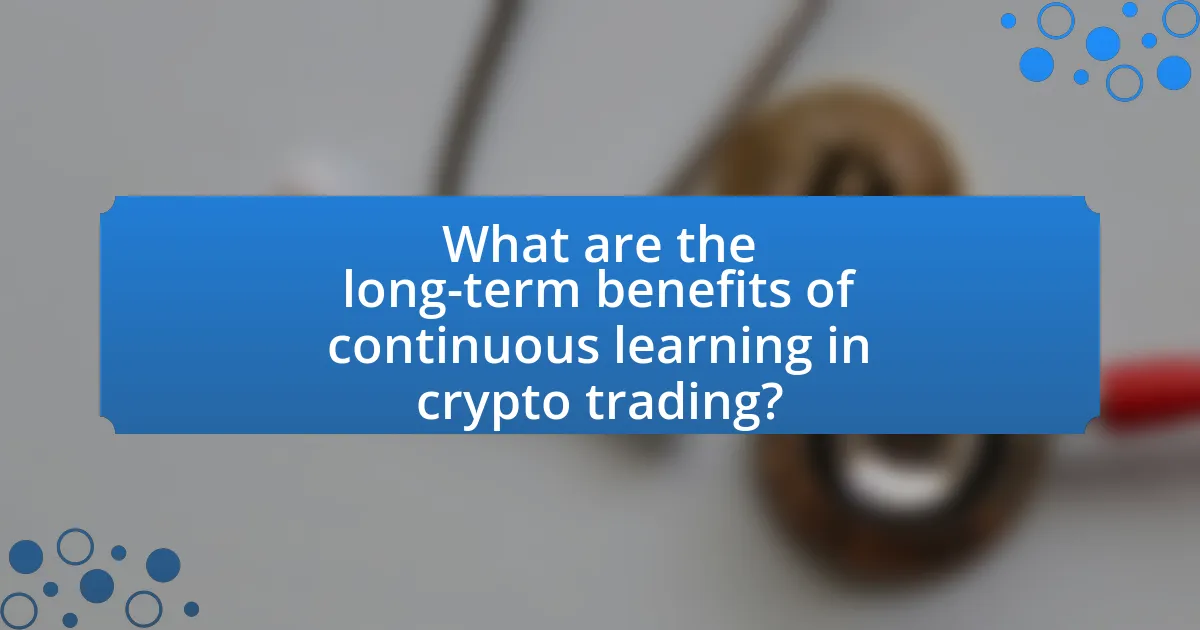
What are the long-term benefits of continuous learning in crypto trading?
Continuous learning in crypto trading leads to improved decision-making and risk management over time. As traders acquire new knowledge about market trends, technologies, and strategies, they become better equipped to analyze data and make informed choices. For instance, a study by the CFA Institute found that continuous education significantly enhances investment performance, with educated investors demonstrating a 20% higher success rate in their trades compared to those who do not engage in ongoing learning. This consistent enhancement of skills and knowledge ultimately results in greater profitability and sustainability in the volatile crypto market.
How does continuous learning affect risk management?
Continuous learning enhances risk management by equipping traders with updated knowledge and skills to identify, assess, and mitigate risks effectively. In the volatile environment of crypto trading, continuous education allows traders to stay informed about market trends, regulatory changes, and emerging technologies, which are crucial for making informed decisions. Research indicates that traders who engage in ongoing education demonstrate improved risk assessment capabilities and better decision-making processes, leading to reduced financial losses. For instance, a study published in the Journal of Financial Markets found that traders who participated in training programs exhibited a 30% decrease in risk exposure compared to those who did not engage in continuous learning.
What strategies can be developed to minimize losses through education?
To minimize losses through education in crypto trading, traders can implement strategies such as continuous learning, risk management training, and utilizing simulation tools. Continuous learning involves staying updated on market trends, technological advancements, and regulatory changes, which can significantly impact trading outcomes. Risk management training equips traders with the skills to assess and mitigate potential losses, emphasizing the importance of setting stop-loss orders and diversifying portfolios. Utilizing simulation tools allows traders to practice strategies in a risk-free environment, enabling them to refine their skills and make informed decisions based on real-time market data. These strategies are supported by research indicating that educated traders are more likely to make informed decisions, thereby reducing the likelihood of significant losses.
How does understanding market psychology contribute to better trading outcomes?
Understanding market psychology significantly enhances trading outcomes by enabling traders to anticipate market movements based on collective investor behavior. This comprehension allows traders to identify trends, recognize emotional responses such as fear and greed, and make informed decisions rather than impulsive ones. For instance, studies have shown that during market downturns, fear can lead to panic selling, while understanding this psychological aspect can help traders maintain their positions or buy at lower prices, ultimately improving their profitability. Additionally, historical data indicates that traders who incorporate psychological analysis into their strategies often outperform those who rely solely on technical indicators, as they can better navigate market volatility and sentiment shifts.
What impact does continuous learning have on trader confidence?
Continuous learning significantly enhances trader confidence by equipping traders with updated knowledge and skills necessary for effective decision-making. As traders engage in ongoing education, they become more adept at analyzing market trends, understanding complex trading strategies, and managing risks. Research indicates that traders who commit to continuous learning report higher levels of confidence in their trading abilities, which can lead to improved performance and better risk management. For instance, a study published in the Journal of Behavioral Finance found that traders who participated in educational programs experienced a notable increase in self-efficacy, directly correlating with their trading success.
How can knowledge reduce emotional trading decisions?
Knowledge can reduce emotional trading decisions by providing traders with a structured framework for analysis and decision-making. When traders possess a deep understanding of market trends, technical indicators, and fundamental analysis, they are less likely to rely on impulsive reactions to market fluctuations. Research indicates that informed traders can better manage risk and develop strategies that align with their long-term goals, thereby minimizing emotional responses. For instance, a study published in the Journal of Behavioral Finance found that traders with higher levels of market knowledge exhibited lower levels of anxiety and overtrading, leading to more rational decision-making. This evidence supports the notion that continuous learning equips traders with the tools necessary to navigate the complexities of the market, ultimately reducing the influence of emotions on their trading behavior.
What role does self-assessment play in a trader’s growth?
Self-assessment is crucial for a trader’s growth as it enables the identification of strengths and weaknesses in trading strategies and decision-making processes. By regularly evaluating their performance, traders can pinpoint areas for improvement, adapt their strategies, and enhance their overall trading skills. Research indicates that traders who engage in self-assessment are more likely to achieve consistent profitability, as they can learn from past mistakes and successes, leading to better risk management and decision-making. For instance, a study published in the Journal of Behavioral Finance found that self-reflective traders outperformed their peers by 20% over a year due to their ability to adjust their approaches based on self-evaluation.
What practical tips can enhance continuous learning in crypto trading?
To enhance continuous learning in crypto trading, traders should engage in regular market analysis, utilize educational resources, and participate in community discussions. Regular market analysis helps traders stay updated on price movements and market trends, which is crucial for informed decision-making. Utilizing educational resources such as online courses, webinars, and books provides foundational knowledge and advanced strategies, allowing traders to adapt to the evolving market landscape. Participating in community discussions, such as forums and social media groups, fosters knowledge sharing and exposes traders to diverse perspectives and insights, further enriching their understanding of the crypto market.
How can traders create a personalized learning plan?
Traders can create a personalized learning plan by assessing their current knowledge, identifying specific areas for improvement, and setting clear, achievable goals. This process begins with a self-assessment to determine strengths and weaknesses in trading strategies, market analysis, and risk management. Following this, traders should research and select educational resources tailored to their needs, such as online courses, webinars, or books focused on their identified areas of improvement. Setting measurable goals, such as completing a certain number of courses within a specific timeframe or applying new strategies in simulated trading, helps maintain focus and track progress. Regularly reviewing and adjusting the learning plan based on performance and evolving market conditions ensures that the plan remains relevant and effective.
What are effective ways to measure progress in trading education?
Effective ways to measure progress in trading education include tracking performance metrics, maintaining a trading journal, and assessing knowledge through quizzes. Performance metrics, such as win-loss ratios and return on investment, provide quantifiable data on trading success. A trading journal allows traders to reflect on their decisions, strategies, and emotional responses, facilitating personal growth and learning. Additionally, quizzes and assessments can evaluate understanding of trading concepts and strategies, ensuring that traders are grasping essential knowledge. These methods collectively offer a comprehensive approach to gauge progress in trading education.
